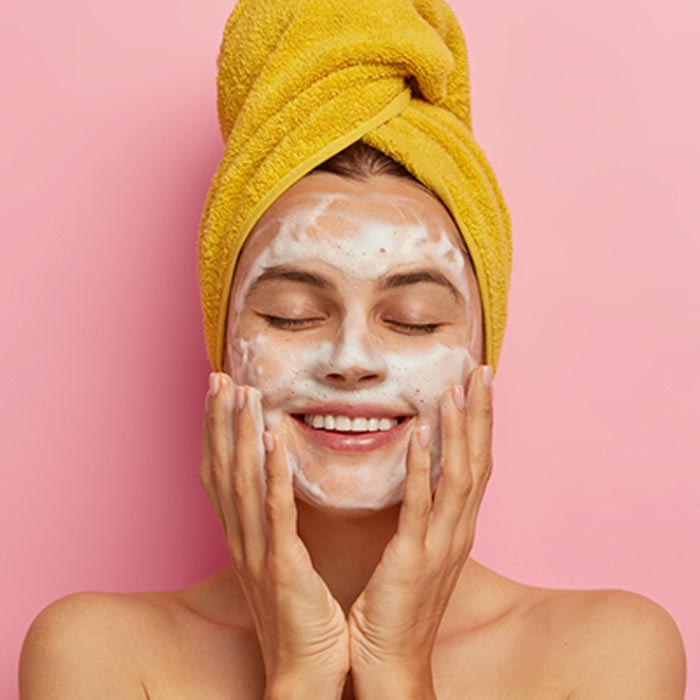The Benefits of Sulfur for Skin and Acne, According to Dermatologists
In an era where skincare is all the rage, sulfur has become a bit of a dirty word. It not only sounds like an emission that we should avoid, but it also smells like it. literally smells. We’re not adding water of to our beauty products. What it lacks in aesthetic je ne se quoi, it makes up for with its acne-fighting capabilities. The formulations are much more pleasant to smell these days. This skincare powerhouse is a must-have for anyone who wants to take care of their skin. It’s not flashy, but it works.
We asked the experts to tell us more about the benefits of sulfur on the skin and how it can help improve its image. Here’s what dermatologists Jessie Chung, MD and Sejal Sharh had to say. They cover everything from its benefits to how it works.
What is Sulfur?
Sulfur is a natural component that is essential for all living organisms. Cheung says that sulfur is found in minerals, rocks, and amino acids. It’s essential for plant growth. You already know that it has a strong smell and a yellowish color. It has been used for centuries in medicine (fun fact: it is also used to make wine). But when it comes down to skincare, it’s commonly found in acne spot treatment, masks, soaps and other products.
SULFUR FAST FACTS
TYPE OF INGREDIENT: Exfoliant
MAIN BENEFITS: Kills bacteria, reduces sebum, and sloughs away dead skin.
WHO SHOULD USE IT: Sulfur can be used to treat those with mild-to-moderate acne, rosacea, seborrheic dermatitis, psoriasis, and eczema.
HOW OFTEN CAN YOU USE IT: According to Shah, it can be used on a daily basis, and some skin types can tolerate milder formulations (such as cleansers) even twice a day.
WORKS WELL WITH: Sodium sulfacetamide. “There are newer formulations of topical sulfur lotions that are combined with sodium sulfacetamide, creating a more gentle and less stinky product,” Cheung says.
DON’T USE WITH: Avoid combining sulfur with other topicals that dry out the skin or exfoliate (such as retinoids, benzoyl peroxide, and salicylic acid) to prevent the skin from becoming too dry or inflamed.
Shah says that sulfur-based products are best for mild to moderate acne. These include whiteheads and blackheads. It’s not as effective as monotherapy for moderate to severe acne. Shah says that while it has similar effects to salicylic and benzoyl acid but is more tolerated.
Benefits of Sulfur to Skin
Sulfur’s antibacterial and anti-inflammatory properties 1, for example, are helpful in treating a variety of skin conditions.
- Reduces oil on the skin: According to Shah, sulfur reduces the sebum. Sulfur is applied directly to the blemish to help dry it out.
- Exfoliation: The sulfur works to remove dead skin cells and impurities. Shah claims that sulfur is a keratolytic agent (meaning that it softens and thins the epidermis) which helps to remove dead skin and prevent clogged pore.
- Fights bacteria: Sulfur has antibacterial properties, and, according to Cheung, sulfur is a dermatologist-favorite because it kills bacteria, fungi, and various parasites.
- Treats sensitive skin conditions: Cheung says because sulfur is anti-inflammatory and helps to soften and exfoliate thick, dead skin, it’s often used to treat acne, psoriasis, and seborrheic dermatitis or dandruff. Shah adds that it’s also known to treat eczema and rosacea.
Potential Side Effects of Sulfur
Sulfur may be drying and might irritate sensitive skin, so Shah suggests using caution when trying products containing sulfur. With that said, she adds that it tends to be gentler than some other acne medications, which usually makes it a good choice for people with sensitive skin (confusing, we know). For this reason, it’s always smart to consult your dermatologist for guidance in selecting the best topical for you.
How to Use Sulfur for Skin
Cheung says because it can be drying and irritating for some, sulfur is commonly prescribed as a short-contact cleanser to be used once a day, usually at bedtime because of the strong scent. If you love a creamy cleanser, Shah suggests the cult-favorite Kate Somerville EradiKate Daily Cleanser Acne Treatment ($44). The three-percent sulfur concentration promises to tackle the oil and breakouts while the honey and rice-bran extract are meant to soothe the skin.
Both Shah and Cheung recommend prescription products to their patients (Ovace Wash Cleansing Gel and Avar Cream are two of Cheung’s favorites), but there are a few favorite formulas you can find over-the-counter. Made with 10 percent sulfur (the highest level permitted), the Bye Bye Blemish for Acne Drying Lotion ($9) is recommended by Shah as the perfect nighttime treatment for your blackheads, whiteheads, or papules. To use, simply dip a Q-tip in the solution and dab it over the area. Another of Shah’s favorites, Sunday Riley’s Saturn Sulfur Spot Treatment Mask ($20) also packs a punch with a 10-percent sulfur concentration as well as niacinamide, and zinc PCA ingredients meant to minimize redness, reduce oil, and clear up acne breakouts.
Avoid layering sulfur with your other acne topicals that may exfoliate or dry out the skin such as retinoids, benzoyl peroxide, and salicylic acid. Experimenting with multiple acne treatments together may be too much of a good thing and cause the skin to become too dry and inflamed.
Oral vs. Topical Sulfur
Not only can you apply sulfur to the skin topically, but you can also consume it orally through your diet or via sulfur supplements to support normal functions of the body.2 However, for skin-specific results, Cheung suggests sticking with a topical. “There aren’t many good studies for oral sulfur supplements for acne, and there is no current recommended dosage,” Cheung explains. “A topical makes more sense because it will affect the skin more efficiently, rather than going through the digestive tract and bloodstream.” You’re better off taking supplements to decrease inflammation and promote gut health, such as pre- and probiotics and adaptogens, according to Cheung, but always consult your doctor before trying any new supplements or making changes to your routine.
The Final Takeaway
While sulfur may not be the most pleasant-smelling of ingredients, it provides countless skincare benefits that we’re unwilling to turn our noses up at. Its anti-inflammatory and antibacterial properties can contend with hero ingredients the likes of benzoyl peroxide and salicylic acid, all while maintaining a far gentler ecosystem for the skin. It can, however, still prove drying for more sensitive skin types so be sure to slowly work the ingredient into your skincare routine and monitor how it affects your skin specifically.
FAQ:
Is sulfur good for a skin infection?
Sulfur can help treat a variety of skin issues including scabies, rosacea, and seborrheic dermatitis. When in doubt, it’s always best to consult with your dermatologist.
Does sulfur make your skin purge?
Because sulfur helps remove the top layer of dead skin cells, you may experience peeling or irritation depending on the product you’re using.
Does sulfur make your skin look younger?
Sulfur plays an important role in collagen production and oral supplementation may help increase skin elasticity, which can contribute to a more youthful-looking appearance.
Resources
- Draelos ZD. The multifunctionality of 10% sodium sulfacetamide, 5% sulfur emollient foam in the treatment of inflammatory facial dermatoses. J Drugs Dermatol. 2010;9(3):234-236.
- Muizzuddin N, Benjamin R. Beauty from within: oral administration of a sulfur-containing supplement methylsulfonylmethane improves signs of skin ageing. Int J Vitam Nutr Res. 2020;1-10. doi:10.1024/0300-9831/a000643
- Cleveland Clinic. Sulfacetamide; sulfur topical skin cleanser or emulsion.
- Liu H, Yu H, Xia J, et al. Topical azelaic acid, salicylic acid, nicotinamide, sulphur, zinc and fruit acid (alpha-hydroxy acid) for acne. Cochrane Database Syst Rev. 2020;5(5):CD011368. doi:10.1002/14651858.CD011368.pub2





